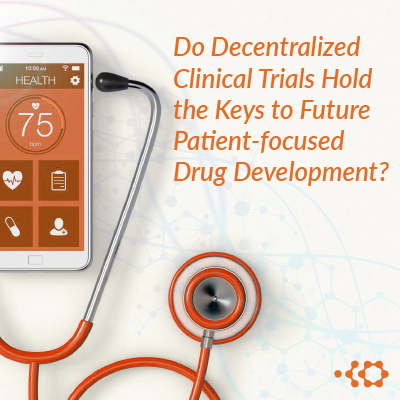Do Decentralized Clinical Trials Hold the Keys to Future Patient Focused Drug Development?

There’s a lot of buzz around the concept of decentralized clinical trials, and rightly so, given the lessons learned from our experience with clinical trials during the COVID-19 pandemic. Decentralized trials are executed through telemedicine and mobile or local healthcare providers. They rely on technology (or medical devices) and information sharing to execute a study without the involvement of a large centralized clinic. In a post-COVID world, drug development will likely employ more decentralized trials to reduce the time and cost of trial programs.
Decentralized trials are fundamentally misunderstood. Decentralized does not mean an absence of healthcare professionals or the elimination of patient contact. Instead, these trials rely more on technology to collect data from devices such as mobile phones or smart watches and electronic symptom logs. This thinking has evolved out of the 21st Century Cures Act.
In the pre-COVID world, decentralized clinical trials haven’t been widely used, partly due to legal, perceived regulatory and practical considerations as barriers to their utility. The FDA has perhaps inaccurately been viewed as an obstacle to drug approvals using decentralized trials, given their lack of experience in reviewing them which supposes inexperience in reviewing some of these data.
Perhaps Institutional Review Boards (IRBs) have opted for traditional clinical trial models because of concerns over safety monitoring, shipping and receiving of investigational drugs, and investigator delegation and oversight. It is reasonable that a lack of familiarity or expertise needed to facilitate the appropriate design could jeopardize a trial. Variations on state licensing associated with telemedicine might also prove challenging.
It can be argued that patient focused drug development, the cornerstone of benefit-risk determinations can be enhanced through the implementation or shift to decentralized clinical trials, because decentralized models may be more convenient for the patients, and in turn, may lead to greater compliance, Decentralized trials may lead to fewer dropouts from the study and patient recruitment may accelerate1. This is because most patients involved in traditional trials must travel to trial sites, and half of clinical trials lose participants because of poor health. Decentralized trials can ease this patient burden. Greater acceptance of decentralized approaches can help drug developers and clinicians reach larger patient pools by making it easier to participate, potentially offering greater participant diversity in studies.
A gap clearly exists between drug efficacy and effectiveness in the real-world setting, as evidenced in breakdown of Phase III trials and RWD can be used as a bridge. Embracing a decentralized trial approach allows for the collection of more data around the study, effectively eliminating the “snapshot” approaches that only provide visibility on a moment in the study. Using technology, health networks or wearable devices allow for continuous data collection to provide a holistic view of the patient in the trial. The difficulty lies in validation and data security, although 21 CFR 11 clearly defines the compliance requirements. Countless people rely on their own personal technology to track steps, distance run, calories burned, and how loud they have been listening to their Spotify playlist through earbuds. Why not apply this portability to our medical care?
The stakes are high in a clinical trial, the devices used in data collection need some type of validation against a standard checklist of parameters, which are simple to consider. The truth is, not all data is equally informative. The need to understand how these data correlate with traditional clinical trials is still evolving. This might lead us to believe that more data is instructive, however that is not the case either. It is the quality of the data that is being recorded in the appropriate context that makes it instructive. So, diverse data collection in the appropriate context is a solution, although how do you define the data to be collected is incredibly important in the clinical trial design. This leads us to data analysis. The data must be linked to other sources so that it is not analyzed in isolation and must come from reliable sources, in a format that can be analyzed by the appropriate models in accordance to a unified standard, which is still lacking in our health care system. Further, that data must be amenable to your statistical analysis plan (SAP) and easily extractable, without the need for ad-hoc analysis approaches.
The 64-thousand-dollar question is when the COVID crisis subsides, will we revert to our old thinking or move to market quickly and do so while capturing good data?
 Jeffrey Mocny, PhD, is a product strategy and development leader who leverages his experience in quality management, strategic planning, IND and NDA guidance, and risk mitigation to guide regulatory projects from conceptualization to completion in the analytical, medical device, biotechnology, nutraceutical, and pharmaceutical sectors. Jeff provides a consultative approach to sponsor relations, devises strategic roadmaps that follow best practices, and spearheads collaborative problem resolution. Connect with Jeff on LinkedIn.
Jeffrey Mocny, PhD, is a product strategy and development leader who leverages his experience in quality management, strategic planning, IND and NDA guidance, and risk mitigation to guide regulatory projects from conceptualization to completion in the analytical, medical device, biotechnology, nutraceutical, and pharmaceutical sectors. Jeff provides a consultative approach to sponsor relations, devises strategic roadmaps that follow best practices, and spearheads collaborative problem resolution. Connect with Jeff on LinkedIn.
Reference
- Myshko, Denise. The Future of Decentralized Trials. PharmaVOICE, Nov/Dec 2019.
